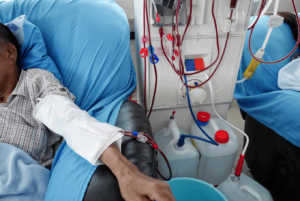
A word of caution to those undergoing hemodialysis: although the procedure can help manage the symptoms related to kidney disease, it does not cure renal failure and should not be viewed as a long-term solution.
There are two kinds of dialysis: peritoneal dialysis and hemodialysis. The former uses the lining of a person’s belly to naturally purify blood; the latter uses an artificial kidney machine that pumps blood out of the body and returns it.
“If a patient stays on hemodialysis for too long, they run the risk of experiencing complications associated with it,” says Dr. Genaro Angcao, a nephrologist at Westlake Medical Center.
“Soon they will have heart problems, weaker bones, or even stroke,”
Dr. Angcao notes that kidney transplant is the recommended treatment for dialysis patients. “It’s the better option if one wants to increase their chances of living a longer and healthier life,” he notes.
Dialysis is a treatment that filters and purifies the blood. While mainly for kidney diseases, it is also used for various conditions including sepsis, liver failure, overdose, poisoning, and aggressive infections like the COVID-19 outbreak.
The chances of one getting off hemodialysis, which usually lasts for four to five hours, depends on the person’s reason for going through it. If the reason is acute kidney disease, like the one that results from contracting leptospirosis, their chances are great. However, if the reason is a chronic kidney disease that requires maintenance dialysis, it’s very unlikely the patient will be removed from dialysis unless they undergo a kidney transplant.
According to Dr. Angcao, dialysis patients should increase their protein intake and avoid sodium-rich food which can cause swelling. They should also steer clear of processed food because it contains high amounts of phosphorus which can cause heart and bone disease, as well as stroke.
Dr. Angcao warns that anyone undergoing dialysis can experience a fluctuation in their blood sugar and blood pressure. “A lot can happen during dialysis if not done right. That’s why we do it with a trained and licensed medical team,” he says.
If you’re manifesting symptoms of kidney disease or want to know more about it or dialysis, you can visit Westlake Medical Center. To get expert medical advice regularly, follow Westlake Medical Center at https://www.facebook.com/WestlakeMedCenterPH/ and https://www.tiktok.com/@wmctiktok.



